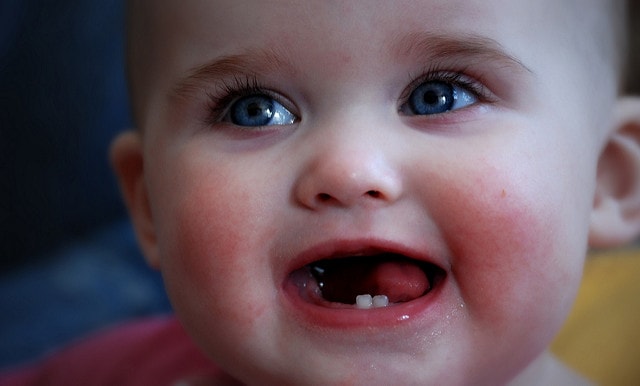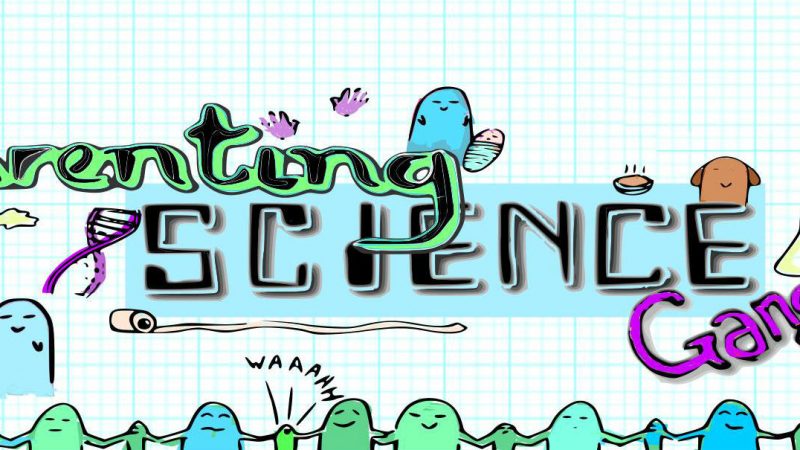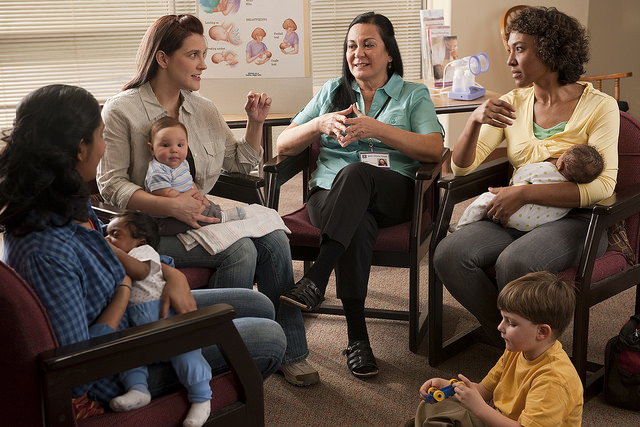
Breastfeeding and dental health – A Q&A with Dr Alaa Bani Hani
Good evening everyone! I’m Alaa Bani Hani, a lecturer and specialist registrar in Paediatric Dentistry (kids’ teeth) at University of Leeds and Leeds Dental Hospital.
I have been searching different approaches for restoring decayed baby teeth and how can we prevent dental decay in children including those who are breastfeeding. Please feel free to ask me about breastfeeding and its relation to children oral health. Also, I’m happy to advise on preventing dental decay in children’s’ teeth!
Photo: “Abbey’s got teeth!” Rona Proudfoot / CC 2.0.
Q: As a breastfeeding peer supporter I frequently get asked if breastfeeding to sleep will rot babies’ teeth. Will it?
Alaa: The research has failed to find a valid link between breastfeeding (BF) and tooth decay up to the age of one. However, it’s crucial to keep the teeth clean after having a meal or BF.
After BF try to brush your baby’s teeth with a tooth brush and tooth paste that has the proper amount of fluoride for his age. If the child falls asleep after BF, clean the gums and the teeth with a wet cloth or gauze.
Having said that it is not established that BF causes dental decay, milk has a natural sugar in it (lactose) which can cause decay. But if you look after your child’s teeth properly by cleaning them then the risk of having decay will reduce significantly.
PSG J: Think you might be writing that a lot tonight, thanks!
Alaa: Avoid night time milk in a bottle. Milk in the bottle at bed time definitely causes tooth decay as the teeth will be bathed in milk all night. With BF, the milk passes behind the teeth to the palate so it does not come in touch with the teeth frequently.
PSG C: So it is the mechanics of breastfeeding that helps mitigate the risk… interesting ??.
Q: Do you have any tips for efficiently brushing toddler’s teeth?
Alaa: Stand behind the child and brush all the teeth especially the back ones. Cover all the teeth surfaces and use fluoridated tooth paste.
Q: I’m obsessive about not eating for 30 minutes before or after cleaning my teeth as I’m worried about softened enamel being affected quicker by the sugar. Is there a point to my 30 minute window or is it hearsay?
Alaa: Yes, we recommend brushing the teeth 30 minutes after the meal as teeth are very soft after having the food and by brushing them straight after you can weaken them further. So give 30 minutes time between food and brushing.
We highly recommend brushing the teeth twice a day; the first thing in the morning and the last thing before you go to bed with fluoridated toothpaste. After the bed-time brushing only plain water can be consumed as it has no sugar in it.
Also in terms of diet, we recommend having 3 main meals and two snacks. Snacks should be low in sugar such as fruit, crisps or milk. Sugar can be consumed once daily with a main meal. Try to limit the frequency of eating. It’s important to give the teeth enough time to recover after every sugar attack.
Now if you are talking about a baby who falls asleep while BF, then wipe the teeth with a wet cloth to remove the milk from teeth.
It’s highly advised to brush teeth twice; first thing in the morning before breakfast and last thing before you go to bed.
PSG C: BEFORE breakfast??
Alaa: Yes, before.
PSG C: That’s brand new information! Grown-ups too?
Alaa: Yes, grown ups too?.
When you brush your teeth the first thing before breakfast, you provide teeth with fluoride so the teeth are stronger and capable to withstand the sugar attack that will occur during breakfast. So there is a lower risk of getting decay.
PSG C: I shall tell everyone I know!
Alaa: Yes, please do?.
PSG D: BEFORE!!! I’ve never heard that before! Minty tea and orange juice… hmm… Maybe a good few minutes before. I will try this with little ones, it might be easier…
Alaa: Yes it’s before! Studies found brushing before breakfast reduces decay and strengthen teeth as it supplies teeth with fluoride that make teeth stronger and more capable of resisting the sugar attack in breakfast.
Q: Is it possible for breast milk alone to cause tooth decay? From my understanding, the lactoferrin in BM kills the strep bacteria that causes decay.
PSG E: This is what I’m most interested in. My dentist was fine with our extended bf and feeding at night; his view is that it’s the biological norm and doesn’t cause issues. But I know this isn’t always shared.
Alaa: There are many studies and research out there that mention many things about BF. Not all of these studies are good ones! The good studies which have looked at other factors that might cause decay in children teeth have failed to find a valid link between BF and dental decay. So BF by itself does not cause decay up to the age of one. There are other factors such as sugar in the food and drinks that the child has, whether the teeth are weak, and whether teeth are brushed and cleaned.
The world health organization recommends BF till the age of 2 while the American Academy of Padiatric Dentistry recommends BF till the age of 1. Having said that BF on its own does not cause decay and that you can BF your child up to the age of 2 if you wish, it’s crucial to keep the teeth clean. Baby’s teeth should be brushed as soon as the first tooth comes through at the age of 7-8 months with tooth brush and tooth paste. Before that the gum should always be wiped with wet cloth or gauze to remove the milk from the gum and teeth.
PSG F: Sorry, but wiping the gums after each feed sounds highly impractical. You might be doing it 100 times a day, and sometimes while the child is asleep. Does anyone actually do that?
Alaa: Not necessarily after each BF but important before the child falls asleep. Try to clean the teeth and gum as much as you can ?. You can do it few times a day and try always to wipe the gums before the baby sleeps.
PSG F: But we know from sleep experts we’ve spoken to that it’s biologically normal for babies to fall asleep while breastfeeding – it is sleep inducing! My son is 4 and has only fallen asleep without a boob in his mouth a handful of times. (Apart from when he’s in the car, and I can’t brush his teeth then either.)
Should I be wiping his gum while he’s asleep then?
Alaa: Yes please do?.
PSG F: Thanks. I’ll try!
PSG G: And to add to this question, is there a concentration of lactoferrin required to achieve the protective limit?
Alaa: Milk has lactoferrin which has the ability to kill the bacteria that causes tooth decay. But we should not only rely on lactoferrin, it’s significant to wipe the teeth and gum as well as brush them.
Q: How can we prevent tooth decay in babies?
Alaa: Good question. Here is what we advise:
1. Breast feeding is really useful up to the age of 1 or as long as you wish.
2. Brushing, then brushing: brush your child teeth twice a day using fluoridated tooth paste appropriate to his age (found in all high street markets) first thing in the morning and before going to bed. If the baby falls asleep and you couldn’t brush his teeth, wipe them with wet cloth or gauze so never leave food or milk on teeth.
2. The child should spit the toothpaste and not rinse to keep the fluoride over the teeth to strengthen them.
3. Stick to 3 main meals and two snacks. Snacks should be low in sugar such as plain milk, fruit, cheese or crisp.
4. One sugar portion is allowed, one small chocolate with main meal.
5. Avoid snacking on sugar all day.
6. Stop bottle drinking (milk or juice bottle) at age of 1. Never let the child sleep with milk in the bottle in his mouth. The teeth will get decayed as milk has natural sugar in it.
7. Also have a regular review with his dentist.
Q: Is natural term BF and dummy use at night/ naps going to affect my baby’s teeth? I’ve been told to take the dummy off my 10 month old and I’d like to know a bit more about it.
Alaa: Thanks for your question. Indeed, the research has failed to find a valid link between natural BF and teeth decay in children. The American Academy of Pediatric Dentistry recommend BF up to the age of one year while the World Health Organization has suggested BF for the first 2 years of the child life!
PSG A: Take that, my mother in law!
PSG K: If you’ve got any links to the research that would be really helpful!
Alaa: Also a dummy won’t cause tooth decay and I believe your child is attached to his dummy, he is still 10 months old, so there is no harm if he uses it to age of 2. However, the key point is not to soak the dummy in sugary drinks or add any kind of sugar to the dummy.
Also, it’s very important to clean your child’s teeth the moment they start to appear in the mouth; brush them twice a day and try to wipe the teeth with wet cloth after BF. By this way you keep the teeth clean and you don’t leave milk on teeth.
PSG C: So a dummy in itself is not harmful to teeth development up to 24 mths – past then?
Alaa: We don’t prefer the child to use the dummy after that as it might affect the alignment of his baby teeth.
PSG C: Is that on average development, or if kids have more teeth early there’s great risk to alignment?
Alaa: I will copy few useful links to the research at the end of the session?.
PSG C: On a slight tangent, how about thumb sucking?
Alaa: Thumb sucking should be stopped at the age of 7-8 years when the permanent top front teeth start to come through. Continue thumb sucking after this age might affect the alignment of teeth resulting in what we call ‘open bite’ where the front teeth can’t bite together when the back teeth do.
PSG C: Neither of mine are thumb-suckers, but I imagine that seems reassuring that the ‘window’ to stop is up to that age, thank you.
Alaa: if they stopped the habit before the age of 7 then the openbite and posterior crossbite are reversible, but after that age both conditions become irreversible and will need dental treatment.
PSG C: I think a lot of parents of 2 and 3 year olds worry they should stop the habit as soon as possible.
PSG L: That’s so good to know! Will a dummy cause overbite??? Although I’m not sure why I’m worried, my husband and I have underbites so maybe it will counterbalance ?.
Alaa: Actually I’m not sure whether a dummy could cause overbite but all what I know is that it’s fine for the child to use it till the age of 2. Usually kids wean off the dummy after this age.
PSG L: Brilliant – I can tell the HV who said get rid 🙂 that’s good to know. Thanks. I didn’t know about wiping the teeth so that’s really useful x
Alaa: It’s very important to clean the gum and teeth clean to get rid of the bacteria that causes teeth decay. The bacteria use the sugar in food, drink including milk to cause decay. By wiping the teeth and gum with wet cloth when teeth have not come through or if the child fell asleep you will reduce the chance of tooth decay. If child is awake, brush his teeth twice a day; before going to bed and on one more occasion during the day.
Q: Can I ask about fruit? As you say it is a safe snack, but of course there is lots of natural sugar in fruit. I know that dried fruit can be very problematic as it sticks to the teeth, but is fresh fruit pretty much OK?
Alaa: Yes, dried fruit are bad as they are high in sugar and stick to teeth. They have higher sugar than the normal fruit. Normal fruit has sugar but much less than the dried fruit and they are high in fibre and don’t stick to teeth. It’s fine to have fruit as snack but in moderation.
Q: Are breastfed toddlers more prone to tooth decay? If yes why does the research suggest that is? Is there any correlation with amount of sugar in mum’s diet?
PSG M: Following. Interested to know about the effect of mom’s diet. I eat plenty of candy a day ?.
PSG J: Equally if mum is low in vitamins, especially vitamin d, will that cause problems with tooth development?
Alaa: It can cause problem in teeth development while the baby is in utero. After birth, your low vitamin D won’t affect your baby teeth.
Candy is not good for teeth and health ? They have plenty of sugar? It’s important not to transmit the bacteria that cause tooth decay (S. Mutans) in your mouth to your baby mouth by avoiding sharing food, spoon, mouth kisses…
PSG M: I know ? but the amount of sugar I ingest shouldn’t affect the amount of sugar in breast milk, right?
Alaa: No it shouldn’t?.
PSG L: Gosh I’m always pretending to pinch his dummy so will have to stop that x
PSG B: Good point!
Q: My little girls (3 and 2) like to swap toothbrushes… I wonder whether I need to worry about the bacteria passing between them when they are both little? I do try to get them to stick to their own and explain why etc…
Alaa: We don’t recommend tooth brush swapping as you can transfer bacteria that cause tooth decay ?.
Q: Does dentistry have a ‘view’ on tongue tie, and its relationship to successful breastfeeding and improved dental development? (I am curious as I have a tongue tie and my mum couldn’t breastfeed me past 2 weeks. I had terrible alignment, very crowded mouth and even now struggle to open my mouth very wide at dental appointments).
Alaa: Regarding tie tongue bring your child to a specialist in kids’ teeth to have a look at his mouth.
PSG C: Both mine had frenulumotomies, but getting treatment is a postcode lottery.
Alaa: Unfortunately, yes?.
PSG C: Is it worth doing for adults? I can’t clean my back teeth with my tongue.
Alaa: You ought to see a specialist in adults’ teeth, I might not be of a help on this one sorry ?.
Q: What can you tell us about in vitro factors that influence later dental health? I have heard people talk about antibiotics use while pregnant but haven’t seen any evidence behind this.
Alaa: There are factors that can affect the development of the child teeth while the baby is still in utero such as the use of antibiotics, getting ill, fever, bad nutrition, complications during pregnancy but none of these factors were found to link directly to defect in teeth. They are all just suggested factors. The cells that form teeth are very sensitive to any change in their environment and can result in defect in the structure of teeth.
Tetracycline antibiotic should be avoided during pregnancy and in children till the age of 6, it causes teeth staining.
Q: I understand that levels of staph in the mouth vary across the population, and it’s recommended you don’t share saliva/cups/etc with your baby. Is there a way to test yourself to understand your own levels? Is this even relevant?
Alaa: Hmmmm we don’t do such test in Leeds Dental Hospital ? The best thing is to avoid sharing food, spoon with your child and avoid mouth kisses so you don’t transmit the bacteria into his mouth. Also, proper teeth brushing helps a lot to reduce the number of bacteria.
Q: Is there any evidence that breastfeeding to two years (or more) reduces the likelihood that the child will need braces/orthodontic treatment as they get older?
PSG N: Yes, I’d like to know if it’s true that breastfeeding provides the best conditions for optimal jaw development.
Alaa: Indeed, there is a useful review by Salone and other colleagues that looked at the evidence behind BF and teeth alignment. They identified 4 good studies that investigated the link between BF and teeth alignment. Two studies found that BF favoured good baby teeth alignment while the other 2 studies failed to find a link. Salone and her colleagues concluded that breastfed children may develop a more favourable occlusion in the primary teeth. But remember that there are other factors that affect teeth alignment including genetic factors.
PSG N: That makes sense, thank you!
Alaa’s Tips
1. Before baby teeth come through, wipe the gums with clean wet cloth to keep them clean.
2. Breastfeeding is useful nutrient for babies and for mother. It reduces risk of infections in babies and cancer in mothers.
3. As soon as the teeth come through brush them with tooth brush and fluoridated tooth paste that is appropriate to his age.
4. Age 0-3 years; use smear layer of tooth paste. Above 3; use pea size.
5. Encourage child to spit and not rinse to keep the fluoride in the mouth to strengthen the teeth.
6. We advise 3 main meals and 2 safe snacks that are low in sugar such as cheese, fruit, crisp and milk.
7. Limit the frequency of sugary food and drink to once daily with main meal.
8. Regular check-ups at the dentist.
We’ll be back to fill in the references to the papers that Alaa mentioned when she is back from a well-deserved holiday.
Meanwhile, why don’t you check out some of our other recent Q&A sessions:
- The Science of Breastfeeding with Maryanne Perrin
- Rural Childhoods with Philomena de Lima


